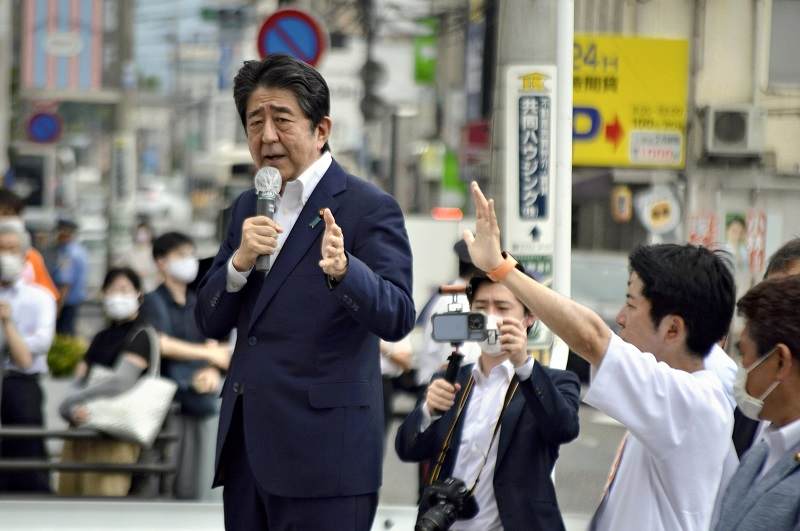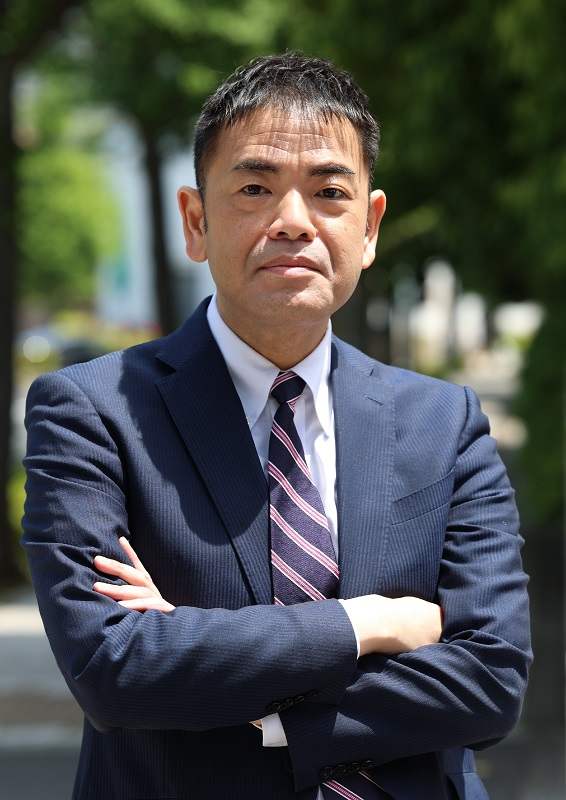Kishida faces a political landscape greatly altered by Abe’s death

Former Prime Minister Shinzo Abe is seen giving a speech in Nara City on July 8, just before he was fatally shot.
8:00 JST, August 20, 2022
The shooting of former Prime Minister Shinzo Abe has had a major impact on the administration of Prime Minister Fumio Kishida. As president of the Liberal Democratic Party, Kishida is doing his best to keep the party’s Abe faction in line so that the government can run smoothly.
Abe became the chairperson of that faction — the LDP’s largest — in November 2021 and had exercised great influence within the party. The Abe faction has 97 members, about a quarter of the LDP’s Diet members. The Kishida faction, with 43 members, is only the fourth largest faction within the party. For Kishida, the support of the Abe faction, the 50-member Aso faction and the 54-member Motegi faction is indispensable.
At a press conference after the party’s House of Councillors election victory in July, Kishida mentioned Abe’s name seven times in the first five minutes, saying, “Since we lost a great political leader, we cannot say that there will be no impact.” A source close to Kishida commented, “This is a message that he will continue to treat the Abe faction with respect.”
In the Aug. 10 Cabinet reshuffle, the prime minister appointed four Cabinet ministers each from the Abe and Aso factions. No other faction received as many posts.
Kishida also named Koichi Hagiuda, a former economy, trade and industry minister, as chairman of the LDP’s Policy Research Council. Hagiuda belongs to the Abe faction and was very close to Abe. The appointment is believed to be aimed at showing Kishida’s stance of emphasizing the Abe faction and promoting smooth coordination within the party on important policies, such as strengthening defense capabilities.
Abe had steered policy discussions toward greatly increased defense spending. He also set a precedent for looser purse strings with high stimulus spending programs. Kishida respected Abe and fell into step with many of his views even though he didn’t necessarily agree with everything Abe said.
In June, the government’s Basic Policy for Economic and Fiscal Management and Reform became the subject of conflict between forces led by Abe, which emphasized aggressive fiscal spending, and forces that valued fiscal discipline. Kishida and LDP Vice President Taro Aso were able to hammer out a compromise with Abe. Kishida lamented Abe’s death to LDP executives in July. “When there was some kind of trouble, all I had to do was convince Abe, and everything worked out. What should I do next?”
By the end of the year, the government plans to revise three key defense documents, including the National Security Strategy and the National Defense Program Guidelines. To compile a plan for the necessary equipment and budget for the next five years, Kishida has to consider replacing the existing budget, issuing government bonds and raising taxes.
Abe called for drastically increasing defense spending to more than 2% of gross domestic product, with the North Atlantic Treaty Organization’s guideline for its members to spend at least 2% of GDP on defense in mind. Abe’s assertion that the spending should be financed by government bonds is deeply rooted in a cautious view, especially in the Finance Ministry, in light of the fact that the debt already tops ¥1.2 quadrillion which is more than twice the size of the economy. A former vice finance minister said the country is like the Titanic, heading for a massive iceberg of debt. After Abe was fatally shot on July 8, a high-ranking ministry official told those around Kishida that even if the defense budget did not reach 2%, it would be no problem as long as the budget was increased as necessary.
In terms of economic and fiscal policy, Kishida is expected to carry on Abenomics while embodying his own flagship policy of a “new form of capitalism,” revitalizing the economy damaged by the coronavirus pandemic.
Although Kishida has secured a solid majority of seats in the upper house and tried to improve his approval rating by reshuffling the Cabinet, there are voices within the government and ruling parties expressing concern about whether he will be able to lead discussions and unite the party without Abe. Political circles are paying close attention to whether Kishida will continue along Abe’s line. If Kishida tries to deviate from the trajectory of strengthening defense capabilities and Abenomics, there is a risk that the arguments with the Abe faction and conservative Diet members who were close to Abe will worsen, shattering party unity.
The appointment of a successor to Bank of Japan Gov. Haruhiko Kuroda, whose term expires next April, may cause controversy. On that topic, Abe had said in June, “I would like the next governor to be someone who can do a solid macroeconomic analysis,” hoping the central bank would continue its monetary easing policy.
After Abe, Kishida must show tough political skills to build a long-term stable government.
Political Pulse appears every Saturday.

Shuhei Kuromi
Kuromi is a deputy editor in the Political News Department of The Yomiuri Shimbun




